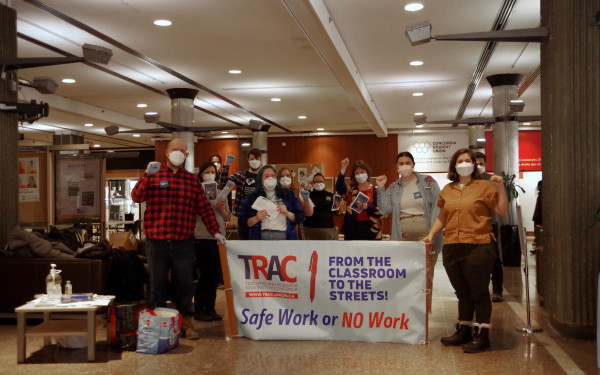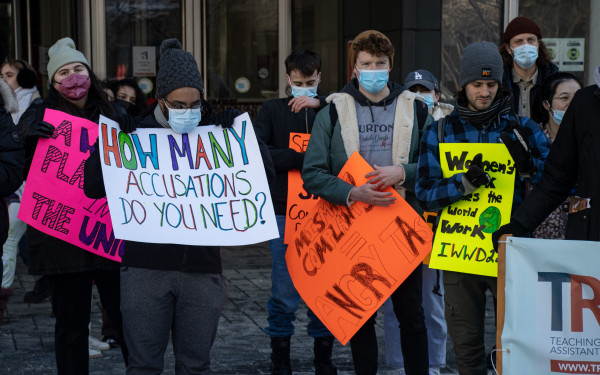Invigilators One Step Closer to Unionization
Exam Supervisors to Vote on Forming Bargaining Unit
In the latest development in a months-long dispute with the university over pay and working conditions, Concordia’s invigilators will vote in November on whether they want to form an official union.
The vote will take place by mail-in ballot between Nov. 10 and Dec. 8. If a majority is reached, a new invigilators’ union will gain certification from the province and the university will be obligated to enter into negotiations with the employees who supervise Concordia’s exams.
Invigilators hope that unionization will lead to improvements in what they see as unsavoury aspects of the job, including minimum-wage pay, the lack of a formal hiring process or system of seniority and poor treatment by supervisors.
“They seem like minor things, but they actually add up to a stressful environment,” explained Bob Sonin, VP Mobilization of Teaching and Research Assistants at Concordia, in an interview with The Link. Involved in the unionization campaign, Sonin organized an initial union drive during the winter exam period.
The invigilators’ grievances were first raised by the Graduate Students’ Association early in the winter semester of last school year. When talks with Concordia on the issue proved unsatisfactory, the GSA reached out to TRAC to help with the unionization process. Because invigilators are often graduate students, many already belong to TRAC, a Public Service Alliance of Canada local that represents Concordia’s teaching and research assistants.
According to Sonin, collective bargaining is the most effective way to improve conditions for invigilators.
“Organize a union and then you’ll have a leg to stand on for complaints, a much more transparent hiring process, a better grievance process and better pay,” he said.
With approximately 180 union cards signed during the drive, the invigilators’ certification request was submitted to the Commission des relations du travail, Quebec’s labour tribunal, in May of this year. However, the process was stalled due to a disagreement between TRAC and Concordia over which invigilators should be allowed to participate in the vote.
TRAC initially considered the regular invigilator workforce to be made up of about 300 people. But the list of invigilators that Concordia provided to the commission in the lead-up to the vote included everyone who had worked as an invigilator throughout the entire year, even if only for a few hours. Concordia’s list more than doubled the number of votes needed to certify the union.
Concordia and TRAC (represented by PSAC) went before the tribunal several times to argue over the criteria for voting.
Sonin considered the university’s position to be unreasonable, saying that many of the invigilators on Concordia’s list had worked too few hours to be representative of the workforce as a whole. He suggested that Concordia’s insistence on a longer list was a tactic to make the vote less likely to go through.
In an email to The Link, Concordia spokesperson Chris Mota refuted this allegation, saying the administration believed that “all invigilators should have the right to be involved in this decision.”
“Invigilators are not a homogenous group,” she continued. “It includes graduate students, retirees and others, who work a different amount of hours for a variety of reasons.”
Finalized on Monday, the official list of electors comprises approximately 210 invigilators, who will receive their ballots by mail in November.
The Road Ahead
Of course, a “yes” vote is only the beginning. If the union is certified, its bargaining unit will be tasked with advancing the invigilators’ cause in a time of austerity and strained labour relations at Concordia.
TRAC bargaining officer Isabelle Johnston, who plans to lead the unit, told The Link that her first steps will be to research the wage issue and consult with invigilators to determine their main priorities.
“The goals are up to the invigilators,” she said. “This is their bargaining unit.”
Johnston was adamant that the university’s invigilators deserve more respect.
“Concordia needs to realize that invigilators are performing a necessary function,” she said. “These are people who are accountable for students’ exams.”
Current invigilator pay, which is at or near the minimum wage, is “unacceptable,” said Johnston. She added that since many invigilators are international students with few other employment options, the wages paid by Concordia are “a bit exploitative.”
Concordia, for its part, stated that it “pays appropriate wages for work performed at the university and respects the labour standards act with respect to payment of wages.”
When asked whether she was optimistic about invigilators’ prospects for achieving their aims, Johnston hesitated to give a definite answer.
“I’m very excited that they are forming a union,” she said. “I think that whatever comes of this, it will bring great changes for the invigilators.”
TRAC in Transition
In order for the vote to go through, TRAC will need to make sure that the invigilators who signed union cards in April know that the vote is taking place and make the effort to send in their ballots.
But internal tensions within TRAC could make getting out the vote a challenge.
The union’s executive committee is experiencing a schism, the yearly budget has not been established and access to funds is blocked.
Normally, Sonin said, TRAC would use its cash reserves to hire organizers to get out the vote by making phone calls and visiting offices and labs. But the local’s current situation will make funding such efforts difficult.
“You can’t do anything if you can’t hire people and you can’t pay them,” Sonin said, adding that he and the other organizers may not even be able to print posters or buy coffee to serve at meetings with invigilators.
“TRAC is sort of dead in the water right now,” he concluded.

__900_597_90.jpg)

_600_375_90_s_c1.jpg)
_600_375_90_s_c1.jpg)

